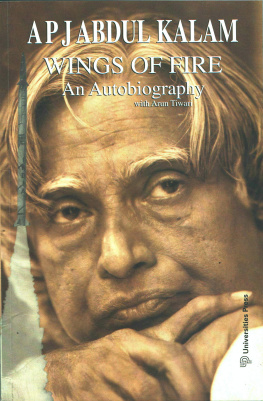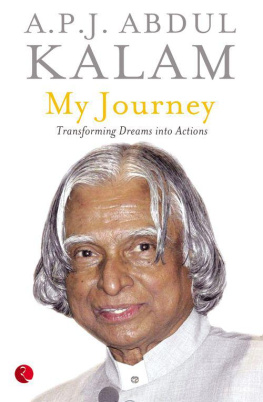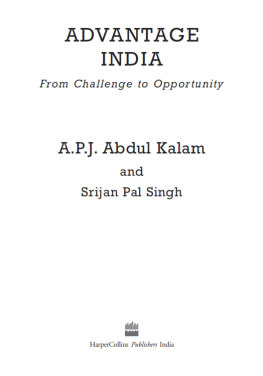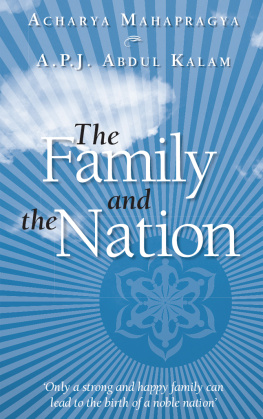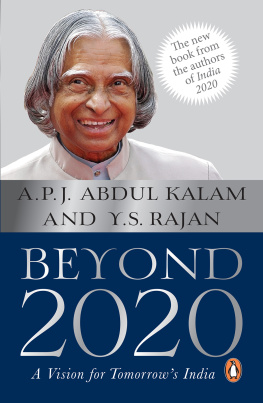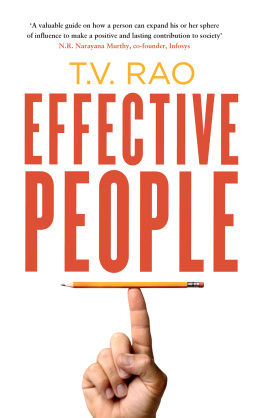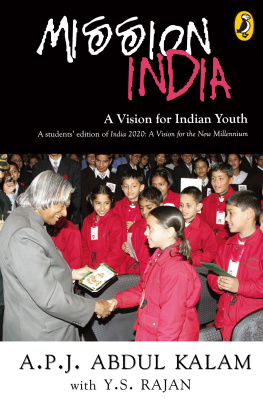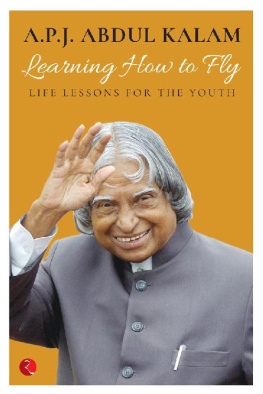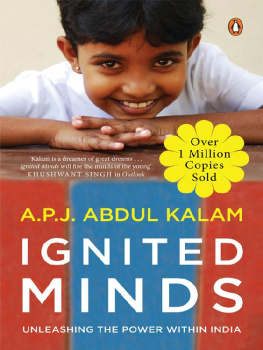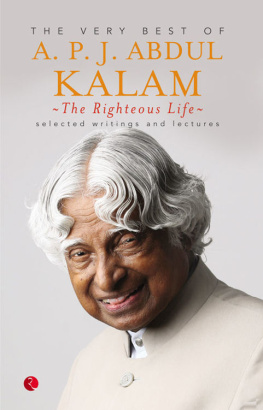Table of Contents
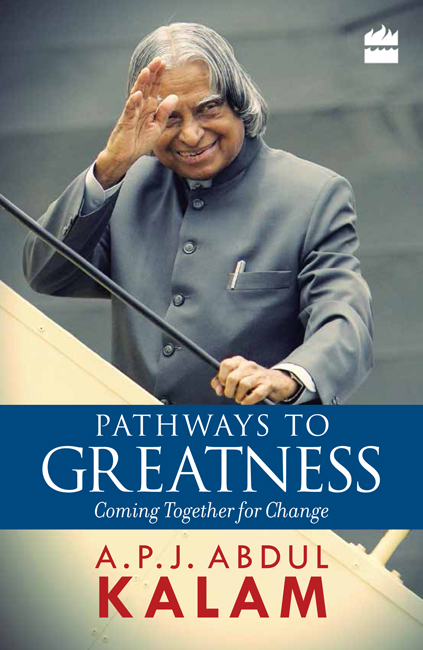
PATHWAYS TO
GREATNESS
Coming Together for Change
A.P.J. ABDUL KALAM

HarperCollins Publishers India
Dedicated to the memory of
Major General R. Swaminathan (Retd)

CONTENTS

The house at 10 Rajaji Marg which Dr Kalam occupied after completing his term as President in July 2007 suited his requirements perfectly. There was a large lawn in front and at the back, with a path running around it which he used for walking whenever he needed to get some exercise. There was a formal receiving room on the ground floor, with an adjoining office where two of his trusted secretaries, H. Sheridon and R.K. Prasad, sat. Turning right in the passageway, there was a long flight of stairs with a blue carpet which had become a little faded over the years with constant use. At the end of it, to the left, were his private quarters. In front of the staircase, behind a door that was always partly open, was another office, where sat Major General R. Swaminathan (Retd), who was his chief of staff at Rashtrapati Bhavan as well as here, and another secretary, D.R. Sharma.
It was in this office that a lot of his ideas incubated from 2007 to his death on 27 July 2015, almost exactly eight years after he demitted the office of President. It was for all practical purposes his ideas lab. His travel routine, intensive while he was President, had become even more strenuous after 2007. He was keynote speaker at an endless number of conferences; there was a stream of inaugurations and launches, including those of a few books; and his continuing programme of presentations to chief ministers on how their states could be put on the fast track to development. These gave detailed overviews of a states strengths, resources and requirements and carried his stamp of research and optimism. And there were, too, his own books, a remarkable number of which have become fixtures on bestseller lists. His travels were varied, to say the least, and not always to the easiest of places to reach, involving long dusty rides in the official car.
The idea for Pathways to Greatness came up in conversations while he was President. He interacted with thousands of people as chief guest at numerous conferences and seminars. These included those held by professional bodies and institutions representing doctors, nurses, lawyers, educationists, scientists from various disciplines, engineers, and the police. He had formed the habit of having participants at these conclaves take an oath promising to uphold the values, principles and dignity of their profession.
I wondered if these could be given more lasting value in the form of a book. It could include anecdotes and stories of people who succeeded despite odds in upholding honesty and integrity, and be an informal reminder to people of the value of their profession and their own role. The context was, in part, our undoubted ability to execute difficult projects and tasks brilliantly but to falter on some of the simpler things, and to build things but slip up on the maintenance, for instance.
He was an inspired teacher but abhorred anything that was pompous or appeared to be didactic. His own way of offering a suggestion was invariably gentle, and he could express an opinion on a sensitive issue in a way that caused no offence. I had often noticed this while this project was still under discussion and we were putting together stories and source material for it, including several books that I passed on to him to help provide context. However, whenever I suggested using past glory as inspiration for the future, he would have none of it. The past was done with, the glory then the product of a different time and circumstances. The problems today were different and on a much larger scale. For instance, the population of India was now well over a billion. Thinking about past glory would not deliver solutions now. It was the future that excited him.
The premise of Pathways to Greatness was simple: laws, rules and values cannot be dictated from top down they have to form part of our own value system. There can be laws against corruption, for instance, but no law can really catch all cases. Or, another example, how will any law ensure that a doctor provides good care to a patient if all he is interested in is making money off him through fees and tests that may not be necessary? It is eventually up to an individual to abide by his values, to follow his own code of conduct. The oaths would be a ready reference and reminder.
Economic development is one key strand in a nations health and happiness. It helps provide education, health and financial security. However, nations, like individuals, also go through difficult times. What happens in those times and how a nation responds then is also a good yardstick of development. Would an emphasis on economic strength alone then be sufficient to sustain us? A truly sustainable path to progress would be one where a nation, as an individual, is able to withstand hardship too without losing discipline. One where an individual could also think of the general good and respect compatriots.
These were some of the ideas discussed in meetings off and on as work progressed. He had submitted a revised draft saying he had done his part. At our last meeting, on 11 July 2015, we decided to dedicate the book to Major General Swaminathan, who had been his close friend and aide for many years until his death in 2013. Then we must do it, Dr Kalam said to me as I left. When I called on 27 July to fix an appointment on his return from Shillong, however, Mr Sharma, who had accompanied him there for his address at the Indian Institute of Management, told me he was unwell. The sad truth came out in TV bulletins later that evening.
There were several books that were done while Pathways to Greatness was under way. A few months after he submitted his revised manuscript, he gave me another, co-written with Srijan Pal Singh, Advantage India, which was published in October 2015. Pathways to Greatness actually precedes it but has taken longer as I was reviewing it with him when he passed away. It is a book that makes an important point. Our own view was that it should be circulated on a very wide scale, to people from all walks of life, from students to householders to leaders, who could draw from and add to it. One of Dr Kalams favourite quotes was: Small aim is a crime. In Pathways to Greatness, he emphasizes it once again, raising the bar for us in a book, one can say, that is of enduring value. It would have delighted him no end to see this book make a difference.
Editor
February 2017

FRIENDS, WHAT YOU hold now in your hands is my thirty-fifth book written either independently or with a co-author. Many of the ones I have written so far have been bestsellers. Two of them, Ignited Minds and Wings of Fire, have sold more than a million copies. But I often asked myself what the message was that I was trying to convey. So far I have written about how our nation can be developed economically, the missions for Indias youth, and sometimes about the events in the life of our country. But I felt I had missed something very important.
The idea behind Pathways to Greatness is that economic progress alone does not make a nation great. What is most important is national character, born out of the value systems that exist in our families, what schools teach students, and the culture of the nation. Let me explain with an example. I was once on a flight from Bhubaneswar to New Delhi, and almost half of the passengers were foreign tourists. After some time I went to the washroom just as one of the foreigners came out. I noticed that the wash basin and the toilet were completely clean. I have not seen this habit of cleaning up after one has used the toilet in many of my countrymen. Such habits are products of national character.


